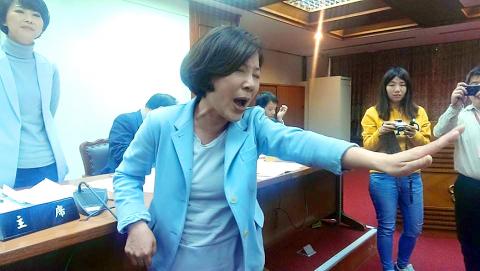The Democratic Progressive Party (DPP) and the Taiwan Solidarity Union (TSU) are manipulating students and are the source of discontent in schools nationwide in ongoing controversy surrounding the Ministry of Education’s planned adjustments to high-school curriculum guidelines, Chinese Nationalist Party (KMT) Legislator Chen Shu-hui (陳淑慧) said.
Chen was referring to students in more than 200 senior-high schools nationwide who have petitioned against the ministry’s decision to make changes that students said reflect a “China-centric” view.
The students also said the planned changes are illegal, referring to a Feb. 12 High Administrative Court ruling that the ministry must make its information more transparent and complete for public scrutiny.

Photo: Chen Yen-ting, Taipei Times
Chen on Friday said the opposition parties and pro-Taiwanese independence groups are manipulating and misleading the students because students lack sufficient information about the current affairs of the educational system.
“Complaints on materials listing the Himalayas as the nation’s highest peak are false and we are offering an award of NT$5,000 to anyone who can find any mention [in the adjusted curricula] that the Himalayas are the Republic of China’s highest peak,” she added.
Chen also defended the ministry in its appeal against the Taipei High Administrative Court.
While the court ruled that the ministry should make public the members of the Committee of Curriculum Review, the ministry has released other information, such as meeting records, and has not conducted any so-called “black box” meetings, Chen said.
KMT Legislator Yang Li-huan (楊麗環) suggested that the ministry abandon the proposed changes, adding that it should negotiate with students about the content of the curriculum guidelines.
The process of learning is supposed to go both ways, after all, she said, with students learning from teachers and the teachers benefiting from students’ questions.
The approaching summer vacations might cause concerned parents to take to the streets in protest, and the nation could ill afford any accidents, Yang said, adding that as the ministry has taken a step back and not insisted on the exclusive use of new textbooks, the issue is not as pressing as it might appear.
“We should all sit down and talk about the matter,” Yang said.
DPP Legislator Cheng Li-chun (鄭麗君) rejected the accusations of misleading students.
The KMT government and Chen are attempting to escalate the issue to a confrontation of pro-localization and pro-unification camps, Cheng said.
The issue is a question of the confrontation between truth and falsity, and the confrontation of education and politics, she said.
However, without full disclosure, the case should be considered as lacking transparency, Cheng said, adding that the ministry was afraid of making the list of members public because whether the ministry “cheated” would be easy to discern once the list is disclosed.
Lack of transparency is the very definition of a “black-box” operation and infringes on procedural justice, Cheng said, adding that the ministry is withholding information to keep the public in the dark and to buy time until the changes go into effect in August, creating a de facto victory.

INVESTIGATION: The case is the latest instance of a DPP figure being implicated in an espionage network accused of allegedly leaking information to Chinese intelligence Democratic Progressive Party (DPP) member Ho Jen-chieh (何仁傑) was detained and held incommunicado yesterday on suspicion of spying for China during his tenure as assistant to then-minister of foreign affairs Joseph Wu (吳釗燮). The Taipei District Prosecutors’ Office said Ho was implicated during its investigation into alleged spying activities by former Presidential Office consultant Wu Shang-yu (吳尚雨). Prosecutors said there is reason to believe Ho breached the National Security Act (國家安全法) by leaking classified Ministry of Foreign Affairs information to Chinese intelligence. Following interrogation, prosecutors petitioned the Taipei District Court to detain Ho, citing concerns over potential collusion or tampering of evidence. The

‘FORM OF PROTEST’: The German Institute Taipei said it was ‘shocked’ to see Nazi symbolism used in connection with political aims as it condemned the incident Sung Chien-liang (宋建樑), who led efforts to recall Democratic Progressive Party (DPP) Legislator Lee Kun-cheng (李坤城), was released on bail of NT$80,000 yesterday amid an outcry over a Nazi armband he wore to questioning the night before. Sung arrived at the New Taipei City District Prosecutors’ Office for questioning in a recall petition forgery case on Tuesday night wearing a red armband bearing a swastika, carrying a copy of Adolf Hitler’s Mein Kampf and giving a Nazi salute. Sung left the building at 1:15am without the armband and apparently covering the book with a coat. This is a serious international scandal and Chinese

Seventy percent of middle and elementary schools now conduct English classes entirely in English, the Ministry of Education said, as it encourages schools nationwide to adopt this practice Minister of Education (MOE) Cheng Ying-yao (鄭英耀) is scheduled to present a report on the government’s bilingual education policy to the Legislative Yuan’s Education and Culture Committee today. The report would outline strategies aimed at expanding access to education, reducing regional disparities and improving talent cultivation. Implementation of bilingual education policies has varied across local governments, occasionally drawing public criticism. For example, some schools have required teachers of non-English subjects to pass English proficiency

TRADE: The premier pledged safeguards on ‘Made in Taiwan’ labeling, anti-dumping measures and stricter export controls to strengthen its position in trade talks Products labeled “made in Taiwan” must be genuinely made in Taiwan, Premier Cho Jung-tai (卓榮泰) said yesterday, vowing to enforce strict safeguards against “origin laundering” and initiate anti-dumping investigations to prevent China dumping its products in Taiwan. Cho made the remarks in a discussion session with representatives from industries in Kaohsiung. In response to the US government’s recent announcement of “reciprocal” tariffs on its trading partners, President William Lai (賴清德) and Cho last week began a series of consultations with industry leaders nationwide to gather feedback and address concerns. Taiwanese and US officials held a videoconference on Friday evening to discuss the